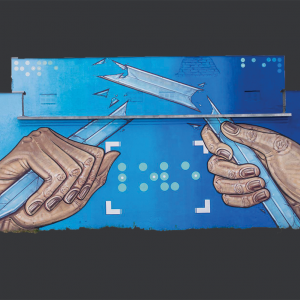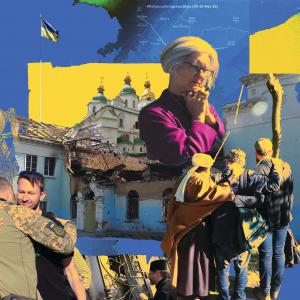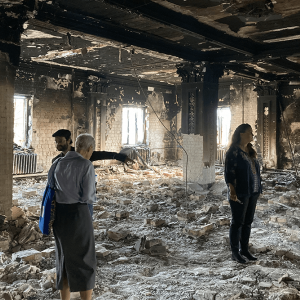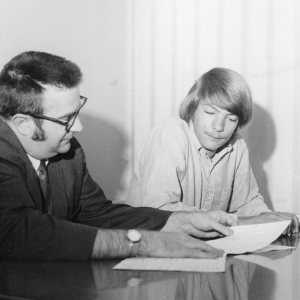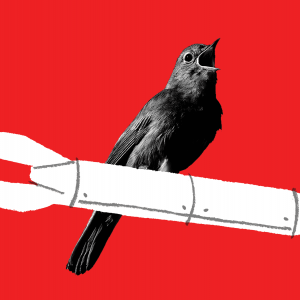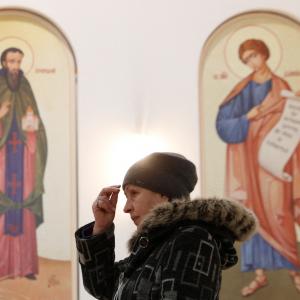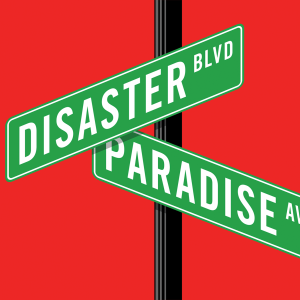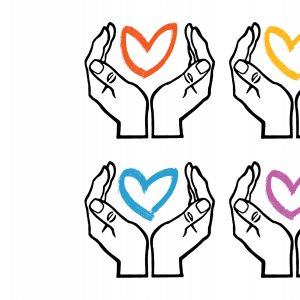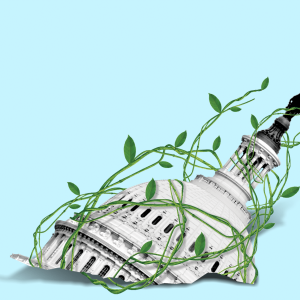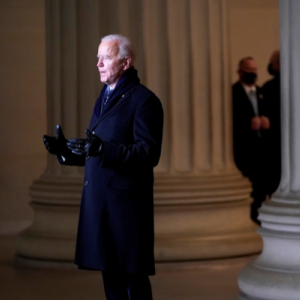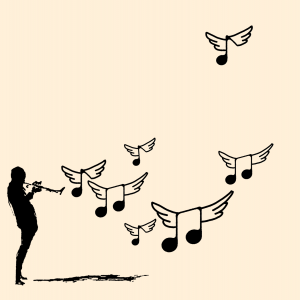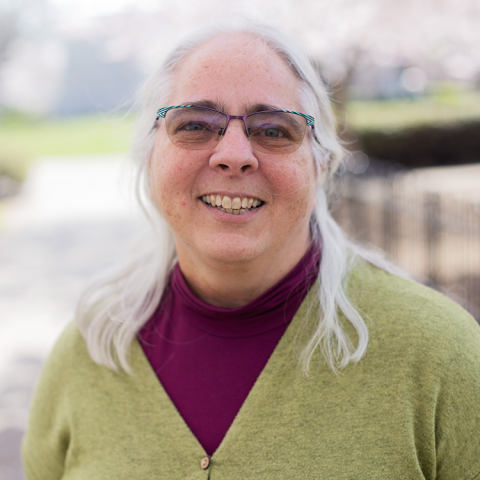
Rose Marie Berger is a Catholic peace activist and poet. She has been on Sojourners staff since 1986, and worked for social justice movements for 40 years. Rose has rooted herself with Sojourners magazine and ministry. She has written hundreds of articles for Sojourners and other publications and is a sought after preacher and public speaker. After living in Washington, D.C., for 35 years, she moved to Oak View, Calif., in 2022.
Rose’s work in Christian nonviolence has taken her to conflict zones around the world. She is active in the Catholic Nonviolence Initiative, a project of Pax Christi International, and served as co-editor for Advancing Nonviolence and Just Peace in the Church and the World, the fruit of a multiyear, global, participatory process to deepen Catholic understanding of and commitment to Gospel nonviolence. Her poetry has appeared in the books Watershed Discipleship: Reinhabiting a Bioregional Faith and Practice and Buffalo Shout, Salmon Cry: Conversations on Creation, Land Justice, and Life Together. She is author of Bending the Arch: Poems (2019), Drawn By God: A History of the Society of Catholic Medical Missionaries from 1967 to 1991 (with Janet Gottschalk, 2012), and Who Killed Donte Manning? The Story of an American Neighborhood. She has also been a religion reviewer for Publishers Weekly and a Huffington Post commentator. Her work has appeared in National Catholic Reporter, Publishers Weekly, Religion News Service, Radical Grace-Oneing, The Merton Seasonal, U.S. Catholic, and elsewhere. She serves on the board of The International Thomas Merton Society.
With Sojourners, Rose has worked as an organizer on peace and environmental issues, internship program director, liturgist, community pastor, poetry editor, and, currently, as a senior editor of Sojourners magazine, where she writes a regular column on spirituality and justice. She is responsible for the Living the Word biblical reflections on the Revised Common Lectionary, poetry, Bible studies, and interviews – and oversees the production of study guides and the online Bible study Preaching the Word.
Rose has a veteran history in social justice activism, including: leading the first international, inter-religious peace witness into Kyiv, Ukraine, following the outbreak of war in 2022, organizing inter-religious witness against the Keystone XL pipeline; educating and training groups in nonviolence; leading retreats in spirituality and justice; writing on topics as diverse as the “Spiritual Vision of Van Gogh, O'Keeffe, and Warhol,” the war in the Balkans, interviews with Black activists Vincent Harding and Yvonne Delk, the Love Canal's Lois Gibbs, and Mexican archbishop Ruiz, cultural commentary on the Catholic church and the peace movement, reviews of movies, books, and music.
Rose Berger has taught writing and poetry workshops for children and adults. She’s completed her MFA in poetry through the University of Southern Maine’s Stonecoast program. Her poetry has been published in Sojourners, The Other Side, Radix and D.C. Poets Against the War.
Rose grew up in the Central Valley of California, located in the rich flood plains of the Sacramento and American rivers. Raised in radical Catholic communities heavily influenced by Franciscans and the Catholic Worker movement, she served for nine years on the pastoral team for Sojourners Community Church; five as its co-pastor. She directed Sojourners internship program from 1990-1999. She is currently a senior editor and poetry editor for Sojourners magazine. She has traveled throughout the United States, and also in Ukraine, Israel/Palestine, Costa Rica, the Netherlands, Northern Ireland, Bosnia, Kosova, Peru, Colombia, Venezuela, and El Salvador visiting primarily with faith communities working for peace in situations of conflict.
Rose was born when atmospheric CO2 was at 319.08 ppm and now lives with her wife Heidi Thompson in Oak View, Calif., in the Ventura River watershed on traditional Chumash lands. Learn more at rosemarieberger.com.
Rose’s articles include:
- Pursuing the Secret of Joy: What is joy when it's not promiscuously tied to happiness, Hallmark, or hedonism?
- Why Our Faith Delegation went to Ukraine?: Our public message was simple: “We have come to Kyiv in solidarity to pray for a just peace.”
- Nonviolence in Najaf?: Will we recognize an Islamic peace movement when we see it?
- Of Love's Risen Body: The poetry of Denise Levertov, 1923-1997
- Glimpses of God Outside the Temple: The spiritual vision of Vincent Van Gogh, Georgia O'Keefe, and Andy Warhol.
- Damnation Will Not Be Televised: Almost everything I know about hell I learned from watching Buffy the Vampire Slayer
Speaking Topics
- Christian nonviolence, peace, war
- Catholic Nonviolence Initiative
- Climate change, creation care, watershed discipleship
- Bible study, liturgical year
- Poetry
- Spirituality and social justice
- Any topic covered in Sojourners magazine
- Catholicism
Speaking Format
- Preference for virtual events, but willing to discuss in-person events on case-by-case basis
Posts By This Author
The Holy Task of Recording the Dead
Keeping a "death scroll" can remind us of our human right to mourn and memorialize loved ones.
IN THE EARLY days of the pandemic, I started a death scroll. Not to be confused with “doomscrolling” (a malady related to one’s smartphone), my death scroll was a physical length of paper on which I penned names and death dates as I learned of them.
Across the top I scrawled: “Blessed are you, Lord Our God, Who Is Keeper of the Book of Life. Today, we learned that Sister Death called ...” On March 13, 2020, I wrote the first name: Barbara Clementine Harris. A towering figure in the American church, Harris registered Black voters in Mississippi in the 1960s, marched from Selma to Montgomery in 1965, and was one of the first 11 women “irregularly” ordained as Episcopal priests in 1974 and the first female bishop in the Anglican Communion. But, because of the COVID lockdown, no churchwide memorial service was held for her.
Pandemics bring death. And, as Christians, it’s impressed upon us to remember. Remember the Sabbath. Remember that your ancestors were slaves in Egypt. Do this in remembrance of me. Remember my chains. But ... I have a very bad memory. So, I made the scroll. When I stopped collecting names in late 2022, my scroll held 36. How many names would your scroll hold?
Many Nations Deliver Babies Free of Charge. Why Can't America?
In a post-Roe world, we need to imagine easier access and greater services for pregnancy and childbirth — no strings attached.
“Wisdom speaks her own praises, in the midst of her people she glories in herself.” What a luscious, full-bodied image from the biblical book of Sirach (24:1). Wisdom has sass! In an increasingly combative society, I’m drawn to Sirach’s prudence, poetic excess, and the authoritative agency of Lady Wisdom.
I’ve been keeping phrases from Sirach, also known as Ecclesiasticus, in mind as post-Roe legislation rolls across the states. The health of women and children (born and unborn) has been weakened, rather than strengthened. Political and social platforms ring out with dangerous nonsense about making criminal statutes apply at the time of fertilization, allowing the death penalty for abortion, or, conversely, promoting violence against “pregnancy crisis centers.”
How do we stop the howl when we feel urgently that lives are on the line? Sirach, which is part of the Catholic canon, says, “The fear of God is an abundant garden; its canopy higher than all other glory” (40:27). “Fear” means “body-trembling awe” before our Creator. Amid so much that I don’t understand and don’t know what to do about, this strange scriptural juxtaposition feels like Lady Wisdom speaking to our present condition.
You Can't (Fully) Blame Your Distraction on Your Phone
An unsettled, restless, disquiet mind is as old as humanity — and makes it hard to meet God.
HAVE YOU EVER had one of those perfect moments?
My wife and I sat on a bench at the farmers market with a plate of steaming hot tamales before us and a bag of crisp fennel bulbs, Pink Lady apples, and fresh spinach at our feet. The air smelled of salt and cooking oil. A deep yellow and iridescent gold light wrapped around us. Every noise fell away in a holy hush. We met, however fleeting, the “still point of the turning world” described by poet T.S. Eliot. Held and beheld.
To be honest, I usually miss these moments. Though I try (religiously) to keep custody of my mind and attention, the world we live in now beeps, dings, buzzes, and updates 24/7. It’s hard for God to break in. Perhaps this description of digital architecture’s pointed intrusions into our one beautiful life is too minimalist. Most days, I’m holding my breath against the crushing dynamics of digital onrush and knowledge outflow. I miss the still points between the crest and lip of that wave.
Ukrainians Embody the Power of Peaceful Protest
In the face of Russia's “special military operation,” citizens are leaning into over 100 years of nonviolent history.
YOU NEVER KNOW where you’ll see the hands of Christ.
In central Kyiv, a mural depicting two elegant hands breaking a sword is surrounded by towering apartment buildings. Painted in 2016 by Ukrainian artist Sergii Radkevych, “Fragments of Hope” was one of a series of murals organized in response to the 2014 conflict in eastern Ukraine. It was public art on a mission to inspire a Ukrainian vision for peacemaking.
Radkevych combines religious iconography with street graffiti and realism. He pays particular attention to expressive hand gestures. “Fragments of Hope” became a frequent gathering point for protests in solidarity with eastern Ukrainians in 2017 and 2019. “This is my manifesto against violence and cruelty, a call to mutual understanding,” said Radkevych at the time. When I was in Kyiv in May, after more than three months of intensive Kremlin-led violence, I was grateful to find the mural still standing.
Why Our Faith Delegation Went to Ukraine
Our public message was simple: “We have come to Kyiv in solidarity to pray for a just peace.”
Our public message was simple: “We have come to Kyiv in solidarity to pray for a just peace.”
‘Before God There Are Yet Other Languages Than Those of Words'
Our ancient biblical stories remind us how complicated silence is — and that some transformations only emerge within it.
DEEP IN OLYMPIC National Park in Washington is the quietest place in the United States. In 2005, one square inch of Hoh Rain Forest—marked by a small red stone—was designated for sound protection.
The logic is simple, according to acoustic ecologist Gordon Hempton: If anthropogenic (human-caused) noise can impact many square miles, as scientists have observed, then a natural point of silence, protected from such sound, can also impact many square miles around it.
Preserving natural silence and setting limits on our human sonic footprint, on land and underwater, is a leading edge of ecological practice and regulation. Similar to the dark-sky movement to reduce light pollution, Hempton cofounded Quiet Parks International to defend natural silence.
For billions of years, the Earth was very quiet. Only the low pounding of waves, rivers of wind, thunder. No birdsong, no frog choruses, no insect beatbox. With flowers came winged pollinators and, eventually, an explosion of nature’s creaturely orchestral arrangements.
Why I Prayed in Kyiv When I Could Have Prayed at Home
I went to Ukraine to hear Jesus speak in the language of the Ukrainian people, to see their suffering and their creative determination, to touch their wounds and understand how the word of life is surviving there. As a Catholic I believe in the “real presence” of Christ — so being really present in the flesh is part of my call and mission. The “real Presence” is the miracle that changes the “absolutely impossible” to a glimmer of the possible.
Duane Shank, First Mennonite Draft Resister to Vietnam, Dies at 70
Duane Shank, a Mennonite peace activist, community organizer, and author, died on April 20 in Goshen, Ind., after two years in hospice. He was 70. The cause was complications from chronic obstructive pulmonary disease, according to his family.
Praying to Hear the Ukrainian Nightingale Sing Again
“Our churches must become centers of service to our people in times of adversity.”
THE RUSSIAN BEAR has once again swatted the Ukrainian nightingale.
In response to Russian President Vladimir Putin’s bloody adventurism in Ukraine, thousands of Russians defied harsh anti-protest laws to hold anti-war demonstrations. Even before rockets exploded over Kyiv, his pro-Kremlin proxies took over eastern Donbas in 2014, killing 13,000 people, a quarter of them civilians, and displacing more than 850,000. Human rights abuses in the breakaway regions skyrocketed. There is no free and independent media. Journalists are targeted. Religious persecution against Catholics, Protestants, Jews, Muslims, and other religious minorities is constant and harsh. Both Ukrainian and pro-Russia armed groups detained hundreds of civilians charged with “espionage” and held them in undisclosed locations, often subjecting them to torture. The slow unraveling of the fragile ceasefire brokered in 2020, in addition to COVID-19 restrictions, left Ukrainians gasping and afraid.
Churches too are caught in the literal crossfire as well as the crossfire of contested histories. As the hot war started, Valery Antonyuk, head of the All-Ukrainian Union of Evangelical Baptist Churches, called on all congregations to prepare to open their churches to the displaced. “Our churches must become centers of service to our people in times of adversity,” he said, emphasizing that his pastors were not leaving.
As Russia Advances, Ukraine's Churches Say ‘No’ to Military Solution
The forces that incite and fuel war can feel inevitable. Even as the Olympics events proceed — a time traditionally greeted by at least temporary truces — reports show that the Russian Federation is once again amassing troops and military hardware along its border with Ukraine. U.S. military and intelligence assessments estimate that a conflict could result in as many as 50,000 Ukrainian civilian casualties and create up to 5 million refugees — all because of a power struggle between NATO, Europe, the United States, and Russia for dominance in the region and control over fuel supply chains. While the forces of imperialism seem inescapable, the role of the church is to show the way out.
Shipwrecked in America: A Lenten Meditation
Here is my heart, O God. Let me be like you in all my ways.
THE ROUGH VOICE of the aging priest is muffled as he bends forward to touch his head to the marble altar. Face down is better than face out, he thinks, where his failure is on full display.
The near-empty church extends into shadow. A handful of worshippers avoid close contact. They grip the wooden pews with desperation, the half-drowned scrambling for a gunwale. “The hulk of the shipwreck behind them,” as the poet says. Their children won’t come to church, the hypocrisy too much to bear. He knows the saints in high niches are no match for the idols in their children’s pockets, provide no relief from their hollowed-out fatigue. He glances up. I am the captain of this ship, he thinks, and we are going down. The bread sits lifeless in the paten. The wine a flatline. Instead of Christ at the Last Supper, the priest recalls Odysseus clinging to the fig tree while the sea greedily sucks down his ship and men. Is that what you get for rustling the gods’ cattle, he wonders.
Translating Women Back Into Scripture
A paradigm-shifting lectionary embraces the Bible's liberating power.
NEARLY 1.4 BILLION Christians around the world receive their weekly exposure to the Bible through a lectionary. In the U.S., as many as 60 percent of Christians attend services in churches that follow a lectionary. For many Christians, this is their only regular exposure to our faith’s sacred narrative.
Even for those who love the ecumenical unifying energy of a common lectionary, we also acknowledge that the scripture snippets we hear on Sundays are chosen almost exclusively by Euro-Anglo male scholars, using Bible translations that reflect the same. (The translation committee for the 2011 Common English Bible was the first to include scholars of color.) It’s hard to embrace the Bible’s liberating power when you can’t find yourself in the story, and it’s even harder to show up when you learn you’ve been edited out of it.
Enter A Women’s Lectionary for the Whole Church, by Wilda C. Gafney, a professor of Hebrew Bible, offering not only an entirely new Christian lectionary but also rigorous and fresh Bible translations that restore women and feminine references to scripture, as well as text notes and preaching prompts—all in accessible language.
Between Disaster and Paradise, a Motorcycle-Riding Monk Found His Way
His mortal remains are tucked in the earth—while his soul cracks jokes with the saints.
A MONK DIES much as he lived—in holy obscurity. That’s the goal at least.
Father Maurice Flood lived as a Trappist for 64 years. At his funeral in August, his abbot described Maurice’s monastic journey as “atypical.” And so it was.
To enter the Order of Cistercians of the Strict Observance (Trappists), one vows silence, stability, poverty, chastity, continual conversion, and obedience to Christ (in the person of one’s abbot). When I met Maurice in 1980, he was uproariously funny and riding his Harley-Davidson around the U.S. with a homemade telescope strapped to the side. Though neither silent nor “stable,” his other vows appeared to hold firm.
What Otters Can Teach Us About Dismantling Empire
When empire is “game master,” Jesus-followers should interrogate the “play.”
TOURISTS SPOTTED OTTERS in the Potomac River this spring. Not unheard of, but rare.
North American river otters are the only otter species in the Chesapeake Bay watershed. For millennia they were an apex species that served as “doctors” for healthy ecosystems by maintaining population levels of fish, frogs, and insects. The Colonial-era transnational fur trade, and its modern-era descendants of land destruction and water pollution, brought otters to the brink of decimation.
Now the otters are returning, a signal that decades of reparatory work to protect the Chesapeake watershed is having modest success.
The word most associated with these agile water weasels is “play.” Play is a fundamental way of interacting in the world; it’s how creatures “practice into being” what we can only imagine at first. Play develops communal trust, agility, resilience, strength, and strategy—and situates the soul firmly in the individual and social body.
Will the Equal Rights Amendment Threaten Religious Liberty?
Greater support for women and LGBTQ rights aligns with greater religious freedom protections. A study by Brian J. Grim at the Religious Freedom and Business Foundation found that “the average level of religious freedom is 36% higher in the countries with higher levels of support for LGBT rights than in countries with low levels of support for LGBT rights.” The expansion of human rights is good for religious freedom. This shouldn’t surprise us: A culture that values human rights for women and LGBTQ people will also value human rights for religious people.
My Wife and I Married on the Feast of Our Lady of Guadalupe
What if sexual identity holds a special place in the complex beauty of the natural order?
AT AGE 43, I found the person I wanted to marry. At 50, I proposed. And she said yes. I, a generations-long Roman Catholic, was proposing to a United Methodist (with deep ancestry in Presbyterianism). We wanted our marriage witnessed and blessed by the church. We wanted to hear our community pledge to uphold and care for us in marriage. But we were not of opposite genders—a prerequisite for marriage in both our denominations.
For seven years we prayed and wrestled over our “mixed marriage” and what to do with our respective denominations’ position, which amounted to “love the sinner, hate the sin.” The priests in our Catholic community recognized us as a couple and tended our wounds when anti-gay teaching came from the pulpit. But they could not invite us on couples’ retreats, consecrate our marriage, or even offer us a blessing. Our evangelical and Methodist communities defended our civil rights, but not our ecclesial ones. If we asked for liturgical rites, we became a “problem.”
Eventually, we found an Episcopal community that not only welcomed us but offered marriage preparation tailored for same-gender couples. We signed on the dotted line, completed the pastoral process, and sent out invitations for our April 2020 wedding. A global pandemic scuttled our plans.
The Lingering Trauma Of Mob Violence
Events like the Jan. 6 attack leave wounds to the soul and psyche.
FOR ME, FURY has a face. In 1999, I sat in a refugee camp with Kosovar families. They had been driven from their homes ahead of attacking Serb crowds aroused to violence by the cruel and charismatic oratory of then-president Slobodan Milosevic.
Thirty-year-old Hajrija thrust forward this question: “How can I live with this pain that our neighbors who we shared our bread with, who my husband shoveled snow from her walk even before he cleared our own ... asked aloud, in our yard while I was hanging my laundry, how she was going to kill me and my children? She was trying to decide between mortar or sniper. How can I go back and live with this person?” Hajrija was incandescent with fury.
On Jan. 6 this year, I saw the other side of Hajrija’s story—the spectacle of an attacking crowd. Several thousand gathered in front of the White House under the sway of another cruel and charismatic president. Like all such leaders, he deceived the crowd by saying their sacred rights had been stolen; that the enemy wants to “indoctrinate” their children; that if they did not act, the enemy would “illegally take over our country.” He loaded the crowd, aimed them at Congress—then gave the command.
It’s Time to Be the Conscience of American Politics
I believe fervently in the words of Rev. Dr. Martin Luther King Jr., who said that “the church is not called to be the master or servant of the state, but to be the conscience of the state.” In that vein, we will be neither chaplain nor sycophant to our new political leaders. Instead, we seek to be a faithful conscience, serving as a bridge-builder and offering prophetic critique (and pressure) when necessary.
Praying With Jazz For Lent
“Is music pleasure, prayer, and praise in one?”
WHEN THE CHAOS gets too much, I listen to jazz. I’m not an aficionado. I just know that brave jazz refreshes my freedom. Lately, I’ve been listening to a lot of jazz.
The stay of execution offered by a COVID-19 vaccine allows for a giddy, perilous optimism. Even a minute crack in our coronavirus armor brings up emotions too dangerous, too chaotic to express: A trembling wave of the suffering we have endured, heavy across the shoulders like the splintery weight of the cross.
For ballast against overwhelming rage, I turn to The Five Quintets by poet Micheal O’Siadhail: “Be with me Madam Jazz I urge you now, / Riff in me so I can conjure how / You breathe in us more than we dare allow.”
Who's at Fault? New Reports on Clergy Sex Abuse Offer Different Views
What the reports have in common is long lists of sexual abuse victims and their broken families. The testimonies of survivors are instructive for the quality of their demand for justice and yet, to paraphrase Tolstoy, each unhappy survivor story “is unhappy in its own way.” Each story is unbearable in its details of the physical and psycho-spiritual torture and the chronic wounds that remain. But in other respects, the two reports could not be more different.



